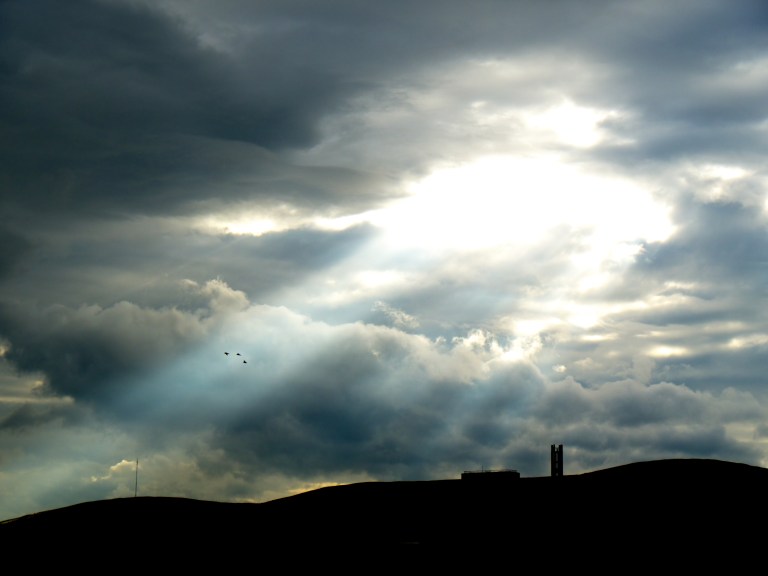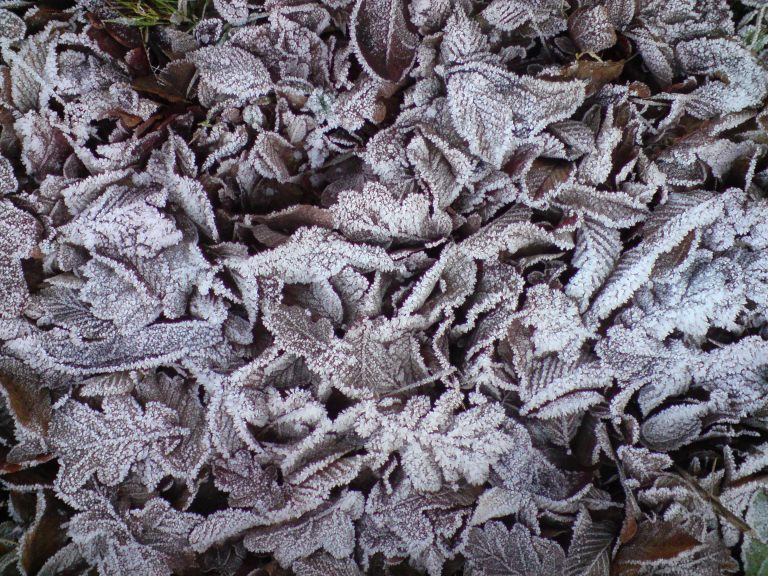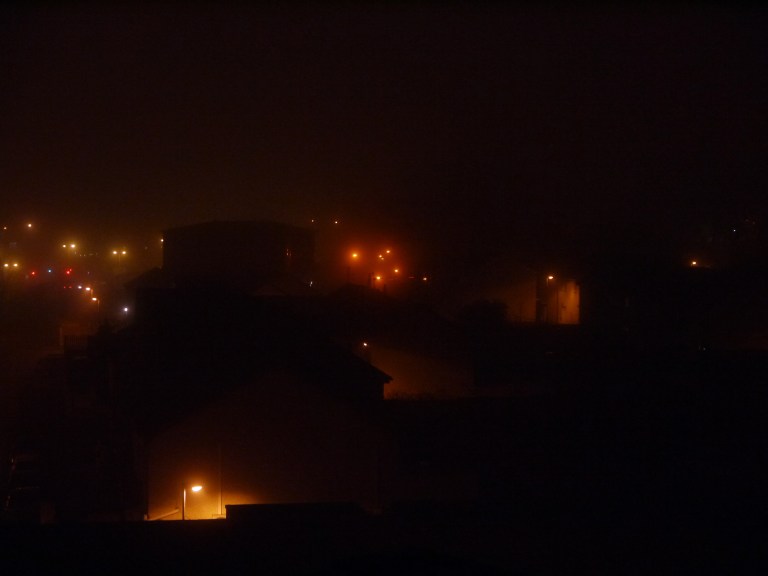
Photography:
Eamonn Stewart was born in Belfast. He is twice winner of the Irish National Children’s Poetry Competition. He trained as an advertising photographer and worked as focus-puller. He has been published in various magazines and some anthologies. His poem Bluebagopolis was nominated for the Pushcart Prize. He has worked as the director of photography on student films. His most recent publication was in The Centrifugal Eye Magazine, where a poem and photo essay were featured.

Field Day
– By Boris Gregoric
Walking out in the morning, a Sunday out of the concrete-and-mortar boxes, past the Mexican looking white church in the suburbs, to the suburbs, over to the meadows, across the wild rye, the narrow gauge railway track, behind the barracks, the shacks, past the dirt yard in which two men in bib overalls putter with the rusty VW beetle — one, under the chassis, prone on the oilcloth and the other shifting the knob of the transistor radio as we hike by, the last few uniformly red tile, brick and mortar one-storey houses, the dogs barking like mad—that perpetually unfinished look of the Croatian brick and mortar homes — two Sunday hikers heading out, swimming almost, Jonah and the fields were the Whale is to receive them into his vast bowels gladly. Another shack, abandoned in the field, next to it a vintage pedal oxidizing splendidly but huge black tires in place, the odd paint job unfinished halfway — the three hues of sienna catching the casual glance. Onward. Three or four chicken scurrying out on no man’s land, clucking about the hard, patchy ground. What can they find?
“When was the last time you saw free-range chickens?”
“Hm, I guess at my grandmother’s, in the country, many years ago…”
Onward, down the ravine, over to the other side, past an air-raid bunker hidden amid the tall wild grasses —‘Beware, Minefield!’ —a lonely sign warned but that the war happened long ago, by now most if not all minefields have been cleared; the life had returned to normal —whatever the normal might be.
Onward, parallel the telegraph poles that always seem so full of promise of the far-off places. And it will be good to disappear. Southern Hemisphere beckons. Never to have to return to the ugly mews and the gray city.
“Don’t you love the telegraphic poles? They remind me of totems,” he said.
“Totems schmotems” she laughed.
“You can almost hear the wires buzzing the news of nothing new under the sun.”
“The wires buzzing I love you.”
“Yes, me too. Let us rest for a bit, here, on the mossy eiderdown, tickled by sun and stars let us watch the gentle drift of the faraway clouds.”
“Oh, lettuce.”
They laughed like two children. These were days before the ozone layer depletion.
“Ozone schmozone.”
They laughed together, getting up, holding hands, and there they went again, over a fallow field, another one, releasing the sweaty hands, the heat rising, he saying, the fallow fields are my favorite fields. Hey, look at the anthill. Giants, aren’t they? Like a fairy tale… he said. Or she said. Down the dirty path to the bottom of the grass gully:
“Nothing like a gully in the middle of nowhere.”
“Like two Spanish explorers!” she said. It made him smile, the childish enthusiasm of the adventure.
“Just so. Like two intrepid Spanish explorers.”
Where the famous Cortázar, the oversized head on the narrow shoulders brimming with various fantastic ideas, would perhaps have discovered bones of the slain conquistadors — the hungry ghosts of the dead in the field of a mindless massacre — shall we say, soldiers in their prime, their last thoughts of their faraway Spanish señoritas — of those faraway days of wine and roses — the old continent explorers find only that noon shadows are to get longer, that a host of sparrows flitters carelessly in the bush, that a thrush might be heard with a song, or that a crow would certainly start to craw its disturbed cry from the telegraphic totem they had left behind. A Sunday in the summer celebrated by the rise of crickets chirping, always quick to upstage cicadas that could not sing, but rather complained with their nonmusical, calling song. Onward, to the top of the gully, where they heard a locomotive whistle in the distance, the whistle so full of promise of the far-off place. Would they only at least climb up to the path, that lead still farther away, toward the levee in the dusty fields.
“Looks like a concrete pillbox.”
“Should we peek inside?“
“Why? You’ll find rats, or some old syringes.”
“What a memorable day, Borsky,” she said.
“Yes, Mia, indeed.”
Yes, always having such a good time together, Borsky thought, no matter where they went on Sunday afternoon field trips and excursions — to the zoo, to botanical gardens, to Sugar Mountain, to Cold Mountain, to the moon or, to the lighthouse in the field of wild rye. And it is maybe time to have it revealed halfway through, the lighthouse — for that’s where they were actually headed. To the lighthouse. Yes, that Lighthouse. Because, every Sunday walkout in a sense is but a walkout to the lighthouse in the field of wild rye.
On the embankment, she stooped low to pick the jolly white daisies, and then — adding to a posy — the salvia-like purple starflowers. How Whitman would have trilled at the sight and sound of bumblebees buzzing around the posy in Mia’s hands, and small yellow butterflies flittering over the huge dandelion head-towers ready to be puffed off with the slightest caress from the warm, lazy stream of air.
“These are huge,” Mia said. When the soft blow of the air scattered some fluff, Borsky made as if to chase the fuzz, and Mia twittered: “Mind you catch your luck that way!” And then Borsky, made a wry face: “Oh, yes, the luck is caught so easily.”
“Borsky, what if we were attacked by a pack of stray dogs?”
“We’d fight back.”
“How hard would we fight?”
“We’d fight tooth and nail, dear. And some of them would have their skins handed back to them.”
“Would anyone, in the case they tore us to pieces, find our bones down in the ravine?”
“People are bound to find you sooner than later, dead or alive, Borsky said. He thought for an instant of a dog trauma he had as a child when a German shepherd tore off the back on his breeches and bit him badly.
“There’s a famous Austrian writer who walked all across Europe. Handke is his name. Once in the south of France a pack of stray dogs attacked him.”
“Where?”
“Oh, I think in Provence, he was making pilgrimage to Mt St.Victoire —the Cézanne’s mountain. ”
“Talking of strays, there’s a mutt!”
It was true, a pitiful, sad-eyed tan colored mutt with most of his tail missing, quickly scurried off in the bulrushes that they were passing by, scared of his shadow, the creature seemed.
“A scrawny little thing…” Then, swiftly, out of nowhere, a pair of riders came cantering from the gully which they have explored. Would they make them yield on the narrow embankment? A snatch of words reached Mia and Borsky’s ears. What is the point in me telling you again? —the man was saying to the woman. As they stopped on the level part, the riders dismounted, and taking over the leather halters, they decided to continued on foot in the opposite direction from Mia and Borsky.
“My father used to be a rider too,” Borsky said.
“Old Josie?”
“Yes, Josie. He even took part in the horse jumping tournaments. I think he was pretty good..”
“I can quite see him.”
“Yes, in his youth he was svelte. Very prim.”
“What about it —what kind of sport is that?”
“Simple, Mia, astride of your horse you try to jump as many bars, hedges, brick walls as you can. Then, one day, you’d be ready for the Olympic Games.”
“The Olympic games?,” she laughed, “I haven’t seen fifteen minutes of them in my entire life.”
“Then, you haven’t missed much.”
“Your dad was a lot like you though.”
“How would you know? You have never met him.”
“Somehow, the way you describe him…quite a dreamer.”
“Not a dreamer,” Borsky said. “But terribly naïve I’d say. Trusting. Easily waylaid.”
“Just like you.”
“Nah.”
“Writers are dreamers too, you know,” Mia said. His eyebrows arched.
“What makes you say that?
“The way they make up things we say or think…never really taking part in life, always observing it from the sidelines…”
“Yes, the writing game seems to be the sidelines.”
“Do you mind what I am saying? You might us it against me in one of your future plays.”
“Don’t worry. The best part is always left out of plays.” They laughed, and walked on. Walking readily over to the meadows, to the sun and the clouds in the endless Sunday afternoon. And already back past the grazing chickens, the rusty behemoth of a tractor, the red bricked houses, the men now gone from the court, away from the skeleton of the VW beetle sitting on cinder. Honk, honk, the honking gander; the barking dogs, finally the asphalt in the setting sun. once more, across the fallow fields. The scattered group of lads kicking the football; the sound of carpet trashing, the car claxon honking, the stooping week-end gardeners hoeing in the tidy cottage parcels of squash, string beans, turnips, tomatoes, what not ¾back in the rectangular prison world of high rise mews.
Here’s to the lyrical genius of a weekend gardener in rubber garden shoes hauling a plastic bucket of bright cadmium green. And to another, in wooden clogs, with a watering can, without hesitation, knowing what to do. Borsky and Mia have entered the elevator, six, seven stories up, and were already at the buzzer.
“Oh, it’s you guys. Come on in, we’ll have a drink.”
“We were in the are, so decided to swing by, briefly…”
“You are welcome. What were you up to?”
“Went for a little hike.”
“Terrific. Where at?”
“Past the church, across the tracks.
“Over those fallow fields.”
“Oh, yes. Astrid and I do go that way sometimes…”
“And you –what’s with you, Peter?
Peter wore a paisley tee with big letters on his chest: God Is Harvesting. Hemp.
“Nothing. Astrid is gone to see her parents. Fixing myself a spaghetti dinner and watching French film. Just started.”
In the room the metal shades were still drawn low, making the room dark and cool. A slow, deliberate film set in the 1880’s French countryside seemed like a perfect summer fare. While Peter puttered in the kitchen fixing iced tea, they sat at the sofa and watched the movie.
“A quiet and peaceful life then,” Mia sighed.
“It seems so, doesn’t it. I’d love to teletransport to the 1880’s,” Borsky said.
“I’d probably go to that period too,” Peter added returning with the glass pitcher of bright yellow libation. “This film is like the most beautiful tableau vivant,” Mia said. Pero had now joined them, and soon he made and passed the joint, its fragrance quickly permeating the small space. Peter’s uncle had problems with kidney stones, “Nothing worked for him” Peter said, ‘until he started drinking huge quantities of bearberry tea.” “The what?” “Bearberry.” “Does it really work?’” “He says it does.” “What about your aunt Louise?” “The therapy is only making her feel worse.” Peter said. “Does she still smoke?”
“She does. She said it helps ease the anxiety if not actually pain,” Peter said.
“Marijuana is good for her.”
“Marijuana is good for everyone.”
“In moderation, yes.”
“Absolutely so.”
It lasted quite a long time, the French countryside, and by the time the film finally ended Mia said, “Eight o’clock already. We better hit the road, Borsky.”
“Better hit the road, before the road hits you.” Peter giggled. They all felt lighthearted. Their muscles convulsed with laughter. It could have been triggered by anything anyone had said.
“Ha ha ha, hoo, hoo, hoo, better hit the road” they shook, and after an exchange of hugs, of unrelated verbal excursions and asides —the parting words petered out and the couple stepped in through the sliding elevator metal door while Peter happily hummed behind their backs:
“So long, farewell, Auf wiedersehen, good night…”
And the two echoed from inside the elevator: “…we hate to go and leave your pretty sight, but sun has gone to bed so long, farewell, auf wiedersehen, goodbye!”
Boris Gregoric is a Croatian-American short story writer, visual artist, translator and language tutor. The author of five books of short fiction, he has translated prose and poetry between English, Croatian and Slovene. This is his blog.

A Hate For Waiting
– By Sophie Fenella Robins
He stood by the open front door tapping his feet, his brow knitted like a worn down woollen jumper. He always hated waiting,
“I think it’s because of my childhood” he said, “when I was a child, my mother was waiting for my father to return from the war. I think she passed her anxiety onto me.”
Anxiety inherited like hair that goes frizzy in the rain. I imagine her pacing over loose floorboards that creak and keep my father awake. Whispers over neighbour’s fences about Mrs Jenkins now left alone forever. The dreaded fallen uniform, hangs like an empty shell, calling memories of what has been lost. Faded photographs that look like the past, remind my father of his mothers worry. Grey bricks crumble with the memory of a national downfall. I listen in with ears from the future, and wonder what it felt like to wait for bombs to drop over St Paul’s.
*
Waiting for delayed flights to summer breaks in Greece caused severe tension in his neck. He had a patch of dry skin on the outside of his index finger, caused by a bad habit of biting the skin. Skin erodes like pebbles on a beach. With his hands behind his back and his shoulders hunched, he paced, back and forth, back and forth, starring at the arrivals board. I prayed for our plane to arrive, because I could see how much waiting pained him. The airport air thick with tired sighs, waited with us, like a silence asking to be broken. We didn’t speak, exhausted by the effort of waiting. We didn’t move, tied to our seats for fear of missing the flight. We didn’t breathe, breathing felt like too much of a distraction.
*
The train is late and I feel my feet tapping. I begin to pace, back and forth, back and forth. The 09.28 has been delayed by two minutes. Two minutes feels like a life time. Anxiety creeps up my spine and causes my teeth to grind. I have a hate for waiting, inherited like hair that goes frizzy in the rain.
Sophie Fenella Robins writes poetry and prose for the stage and the page. She graduated from The Royal Court Young Writers Program in 2006, she then went on to study English Literature and Drama Studies at The University of Sussex. In 2012 she graduated from Central School of Speech and Drama with a masters in Performance Practices and Research. She is the co-founder of Portmanteau Performance Company and the The Patchwork Paper. She has also been short listed to be the Young Poet Laureate for London. Follow Sophie on twitter @sophiefenella
